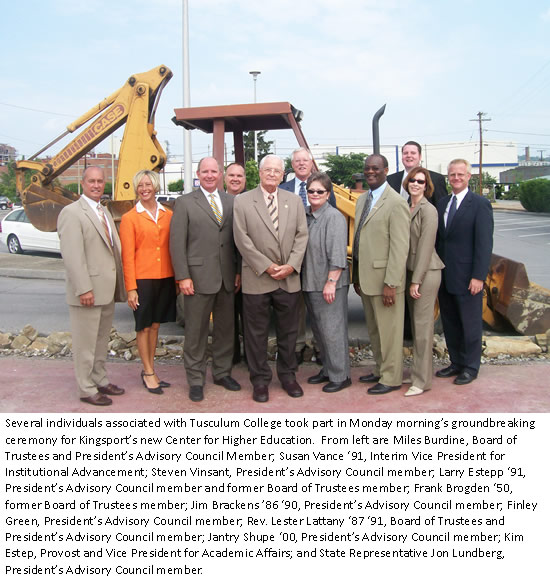
Tusculum College representatives, including current and former Board of Trustees members, members of the College’s President’s Advisory Councils and TC staff members were part of a special event on Monday that brings a long-standing Northeast Tennessee higher education ambition closer to reality.
Regional leaders in government, business and education broke ground on the new Kingsport Center for Higher Education (KCHE) in a morning ceremony. Among those symbolically turning dirt with a shovel was Tusculum Provost Dr. Kimberly Estep.
Estep said, “Tusculum College is honored to have the opportunity to join the Association of Founding Partners of the Kingsport Center for Higher Education. As Tusculum has been offering academic programs to working adults in east Tennessee since 1984, we believe our programs are ideal for the students who will complete their college degrees at this new center. We look forward to the opportunity to work with the other founding partners to provide enhanced educational opportunities for the people living in the Kingsport area.”
More than 100 people attended Monday’s ceremony for the KCHE — city and chamber officials, state legislators, college and university representatives and people interested in the future of downtown all gathered to witness the official start of building a higher education center in downtown Kingsport.
“If you have the right people who have passion, you can really accomplish so much more than you ever dream of accomplishing,” said former Kingsport Mayor Jeanette Blazier. “This is a very good day.”
The city of Kingsport will build a 54,000-square-foot, technologically modern higher education center at the corner of Clay and Market streets in the downtown area. The center will be able to accommodate approximately 800 students and will include a 220-seat auditorium, two 60-seat lecture halls, classrooms, a media center and physical science labs.
The facility will be the first LEED (Leadership in Energy and Environmental Design)-certified green higher education building in the state.
The $12.9 million project calls for Northeast State Technical Community College to operate the facility and offer the first two years of core courses. Participating universities and colleges, including Tusculum, would then offer their bachelor’s and master’s programs, with degrees being in the name of the university or college offering the program.
Along with Tusculum College, King College, Lincoln Memorial University, Carson-Newman, and the University of Tennessee are also participating. Northeast State is in discussions with other possible participants.
The charter colleges and universities plan to offer more than 70 associate degrees, eight baccalaureate degrees, 10 masters degrees and one educational specialist program. The plan is for all coursework required for the degrees to be available in the center.
“We are committed to making the project work,” Locke said. Builders J.A. Street and Associates are almost ready to begin work on the site. Plans call for the KCHE to be open for the fall semester of 2009.
“We’ll see some activity in earnest immediately. It’s a tight construction schedule and you should see steel go up very quickly,” Fleming said.
One goal in building a higher education center in Kingsport is to raise the educational attainment level of Kingsport’s citizens, producing qualified employees local business and industry needs. Planners hope the center will act as an economic stimulator for downtown Kingsport.
The idea of a higher education center in downtown Kingsport dates back nearly 20 years, as Blazier told the crowd in attendance on Monday. Blazier said the idea first came up in 1989 and 1990 during a visioning process, then again during the Model City Coalition project in the late 1990s and again in subsequent summits and Board of Mayor and Aldermen (BMA) retreats.
In 2006 the BMA signed off on the project, and since then the city has moved forward with making the center a reality — purchasing the old Tire Center property to be the location and authorizing $11.27 million in bonds to fund the construction.
“At this point we wanted to control the land to preserve the future opportunity for expansion,” Fleming said. “We do not plan any future public expenditures on higher education buildings. We wanted to have the land available to partner with an institution that wants to build its own facility in the future.


